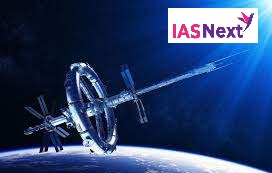CURRENT AFFAIRS
Get the most updated and recent current affair content on Padhaikaro.com
Space station
- IAS NEXT, Lucknow
- 19, Jan 2022

Reference News:-
As China gears up to become the only country to have an exclusive and probably the only space station by 2024 or latest by 2030, its neighbor, India too has plans to follow suit in a few years.
- Recently, the Union Minister for Space Jitendra Singh announced in Parliament that India’s first space station would be set up by 2030.
Background:
Even though the retirement of the ISS is currently scheduled for 2024, NASA and the international partners have indicated that the ISS’s operational life could be extended to 2030.
About China’s Space Station:
- The new multi-module Tiangong station is set to be operational for at least 10 years.
- The space station will operate in low-Earth orbit at an altitude of 340-450 km above Earth’s surface.
Significance of the space station:
- The low orbit space station would be the country’s eye from the sky, providing round the clock bird’s-eye view for its astronauts on the rest of the world.
- It shall aid China’s aim to become a major space power by 2030.
Concerns:
China’s space station will be equipped with a robotic-arm over which the US has raised concerns for its possible military applications.
- The Concern is that this technology “could be used in a future system for grappling other satellites”.
Indian Space Station:
- The Indian space station will be much smaller (mass of 20 tonnes) than the International Space Station and will be used for carrying out microgravity experiments (not for space tourism).
- Preliminary plan for the space station is to accommodate astronauts for up to 20 days in space, and the project will be an extension of the Gaganyaan mission.
- It will orbit Earth at an altitude of around 400km.
- ISRO (Indian Space Research Organisation) is working on a space docking experiment (Spadex), a technology that is crucial for making the space station functional.
Other space stations:
- The only space station currently in orbit is the International Space Station (ISS). The ISS is backed by the United States, Russia, Europe, Japan and Canada.
- So far, China has sent two previous space stations into orbit- the Tiangong-1 and Tiangong-2 were trial stations.
Significance:
- Space stations are essential for collecting meaningful scientific data, especially for biological experiments.
- Provide platforms for greater number and length of scientific studies than available on other space vehicles.
- Each crew member stays aboard the station for weeks or months, but rarely more than a year.
- Space stations are used to study the effects of long-term space flight on the human body.